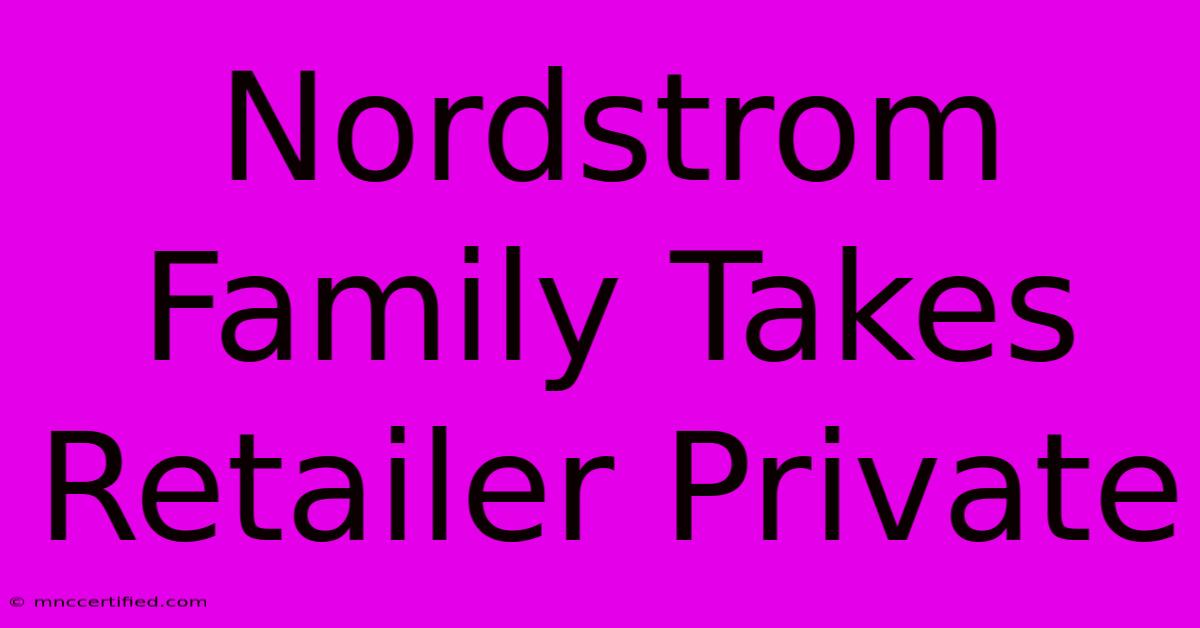Nordstrom Family Takes Retailer Private

Table of Contents
Nordstrom Family Takes Retailer Private: A Deep Dive into the Buyout
The Nordstrom family's decision to take the iconic department store chain private marks a significant moment in retail history. This move, finalized in August 2023, concludes a months-long saga involving a bidding war and significant financial maneuvering. This article delves into the intricacies of this buyout, exploring its implications for the company, its employees, and the future of the retail landscape.
Understanding the Buyout: Key Players and Transactions
The privatization effort was spearheaded by a consortium primarily composed of members of the Nordstrom family. This group, including the descendants of founder John W. Nordstrom, successfully outbid other potential buyers, ultimately securing a deal valued at approximately $8.8 billion. This represents a significant premium over the company's publicly traded stock price, showcasing the family's commitment to the long-term future of the brand. Key figures involved included Erik Nordstrom, Peter Nordstrom, and Blake Nordstrom's estate.
The transaction involved taking the company completely private, meaning Nordstrom stock (JWN) is no longer publicly traded on major exchanges like the NYSE. This removes the pressure of quarterly earnings reports and shareholder expectations, giving the family greater flexibility in implementing their long-term strategic vision.
Why Go Private? Strategic Advantages and Challenges
Several factors likely influenced the Nordstrom family's decision to take the retailer private. These include:
-
Long-term Vision: Freed from the demands of short-term profitability, the Nordstrom family can focus on revitalizing the brand and investing in long-term growth initiatives, such as enhanced e-commerce capabilities and innovative in-store experiences.
-
Operational Flexibility: Private ownership allows for more agile decision-making and strategic adjustments without the need for shareholder approval. This is crucial in today's rapidly evolving retail environment, where adapting to changing consumer preferences is paramount.
-
Reduced Public Scrutiny: Operating privately reduces the scrutiny associated with publicly traded companies. This can be advantageous when implementing potentially controversial restructuring plans or making large-scale investments with uncertain returns.
However, this decision also presents challenges. Access to capital markets becomes more limited, and the absence of public scrutiny may lead to less accountability. The family will also need to navigate the inherent risks associated with increased leverage, as substantial debt financing likely funded the buyout.
Impact on Nordstrom Employees and Customers
The buyout's impact on Nordstrom employees and customers remains to be seen. While the family has expressed a commitment to retaining employees and maintaining the brand's reputation for customer service, significant changes may still occur. Potential adjustments could include store closures, restructuring of departments, or alterations to compensation packages.
The family's ownership structure might allow for more substantial investments in employee training and development, boosting morale and improving customer service. However, cost-cutting measures could be implemented to mitigate the financial burden of the significant debt incurred during the privatization process.
The Future of Nordstrom: Navigating the Changing Retail Landscape
The Nordstrom family faces a significant challenge: adapting the iconic retailer to a dynamic retail landscape increasingly dominated by e-commerce giants and fast-fashion brands. Their strategy will be crucial in determining Nordstrom's future success. Successful navigation requires a comprehensive approach that blends:
-
Strengthening the Omni-Channel Experience: Seamless integration of online and offline shopping experiences is vital. This includes enhancing the company's website, improving mobile app functionality, and creating innovative in-store experiences.
-
Investing in Technology: Embracing technology through personalization, data analytics, and supply chain optimization is key to staying competitive.
-
Curating a Unique Brand Identity: Differentiating Nordstrom from competitors requires a strong brand identity that resonates with customers. This might involve focusing on specific niche markets or emphasizing superior customer service.
Conclusion: A Gamble on the Future of Retail
The Nordstrom family's decision to take the retailer private represents a significant bet on the future of the brand. While the move offers significant strategic advantages and opportunities for long-term growth, it also involves substantial risk. The success of this buyout will depend heavily on the family's ability to execute a clear, well-defined strategy that addresses the challenges facing the retail industry while preserving the Nordstrom brand's legacy and reputation. Only time will tell if this bold move proves to be a brilliant strategic play or a costly gamble.

Thank you for visiting our website wich cover about Nordstrom Family Takes Retailer Private. We hope the information provided has been useful to you. Feel free to contact us if you have any questions or need further assistance. See you next time and dont miss to bookmark.
Featured Posts
-
Us Greenland Ownership Trumps Stance
Dec 24, 2024
-
Trump Claims Greenland Ownership Crucial
Dec 24, 2024
-
Gaetz Ethics Report Five Key Findings
Dec 24, 2024
-
Red Sox Land Buehler
Dec 24, 2024
-
Santas Flight Christmas Eve Updates
Dec 24, 2024